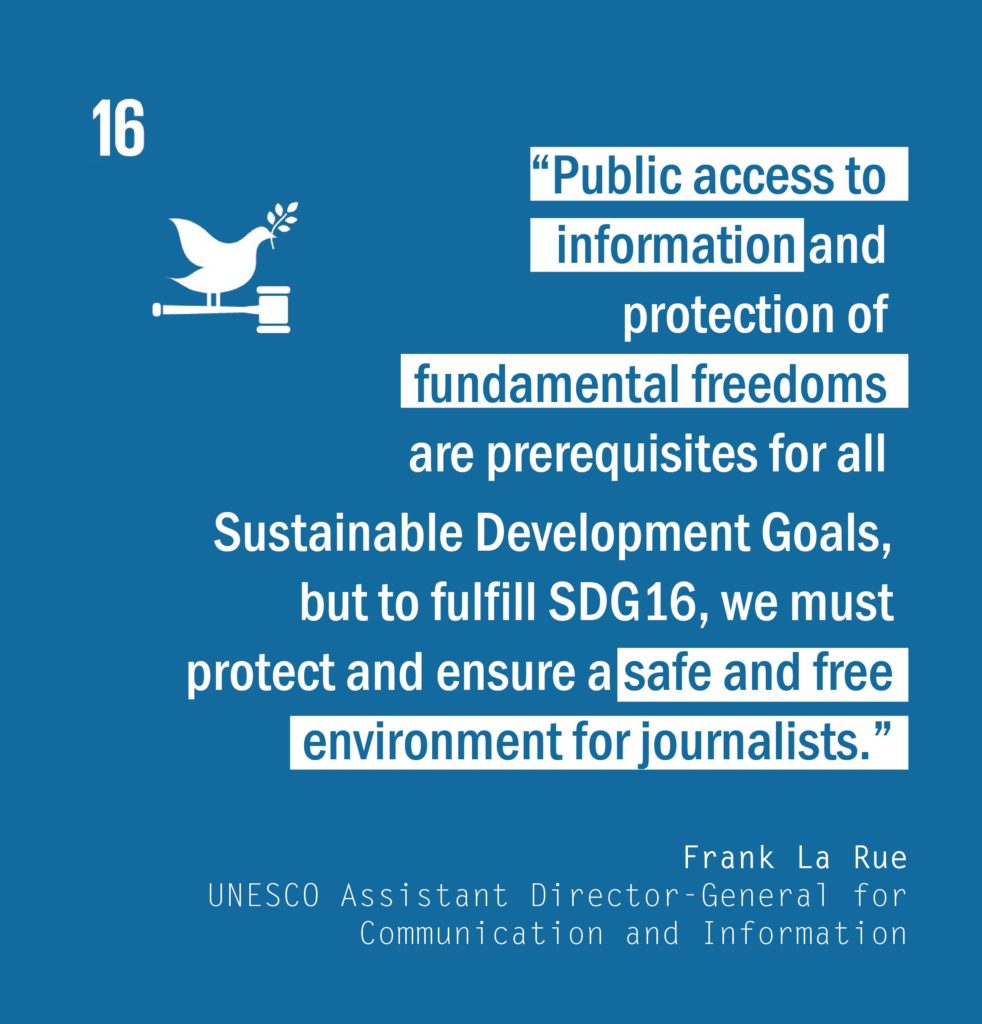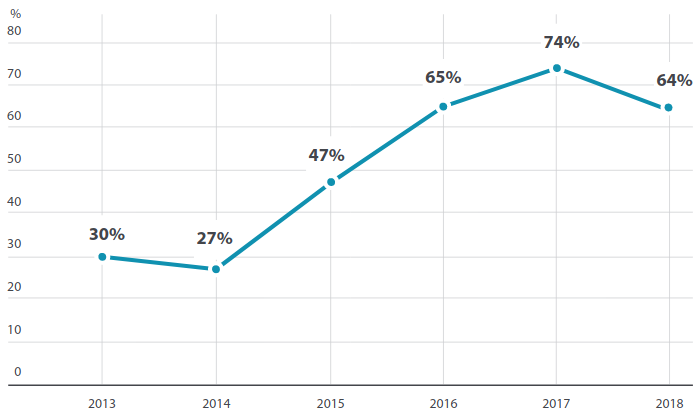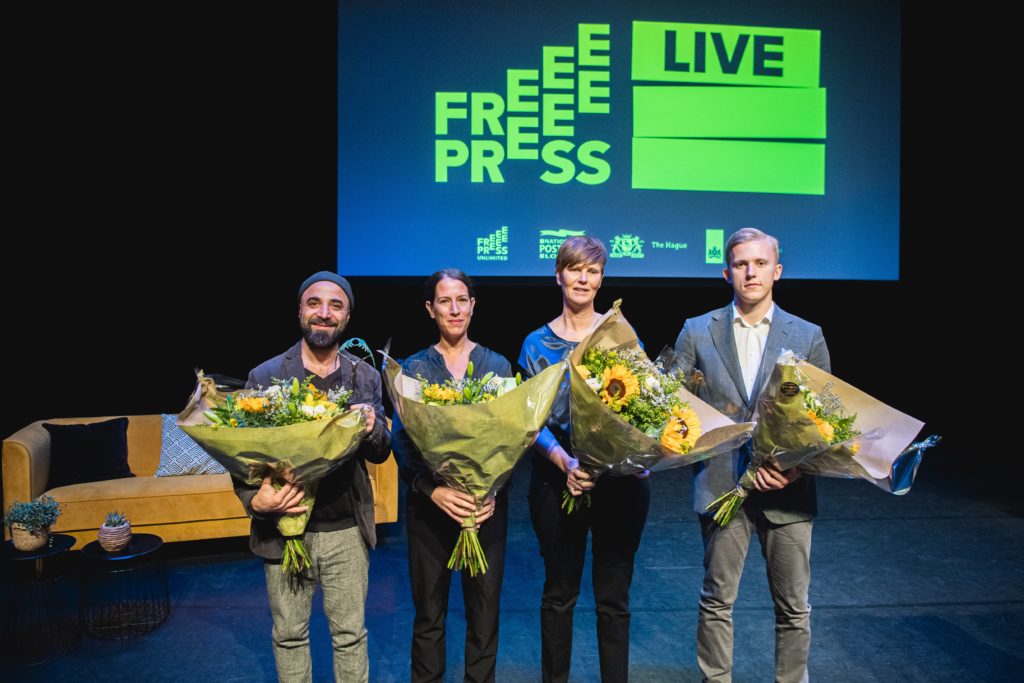Over the years numerous resolutions and declarations have been passed by international organisations regarding the safety of media professionals. These documents are often the normative foundations of national and international regulatory frameworks, which seek to establish a safe working environment for media professionals. It is important to translate these international standards into domestic law and/or concrete policy actions that will allow for tracking progress at national and local level. Free Press Unlimited, with its knowledge, expertise, extensive network, and membership in various networks and coalitions, regards itself well-placed to translate local needs and realities into concrete policy recommendations that feed into the international agenda. Advocacy and campaigning can together serve to change policies and legislation necessary for bringing about a safe environment for journalists. This page shows a number of examples of the advocacy and campaigning activities of Free Press Unlimited and its partner organisations.
Navigate quickly
Advocacy activities of Free Press Unlimited
Reporting on the killings of journalists
Universal Periodic Review
Special Procedure meetings in Dutch Parliament
Emergency fund for journalists
Partnership Media Freedom Rapid Response (MFRR)
Advocacy activities of partner organisations
Campaigning activities of Free Press Unlimited
Advocacy
Activities of Free Press Unlimited
Impunity for crimes against media workers perpetuates the cycle of violence and results in self-censorship, which further affects press freedom. Therefore, Free Press Unlimited has engaged in international advocacy, with the principal aim of stimulating UN agencies and national governments to do judicial inquiry into the killing of journalists and to enhance the safety of journalists by ending impunity. Its international advocacy activities are often carried out in cooperation and synergy with other like-minded organisations. They are typically aimed at actors such as the Dutch Ministry of Foreign Affairs, the Dutch Parliament, UN organisations, national governments and civil society. Moreover, Free Press Unlimited is a member of several international networks and coalitions, and therefore has initiated several joint declarations on the safety of journalists. Furthermore, through the International Civil Society Coalition on the Safety of Journalists, Free Press Unlimited regularly provides input on documents and processes revolving around the safety of journalists.
Learn more
Joint open letter: ‘Protect media freedom in times of COVID-19’ (March 2020)
Joint statement: ‘EU must create safe environment for journalists reporting in Greece’ (March 2020)
Joint statement: ‘Equality for female staff in the media: media leaders take action’ (March 2019)
Joint open letter: ‘Call for EU action to protect journalists’ (March 2018)
Reporting on the killings of journalists

In 2015 the 2030 Agenda for Sustainable Development was adopted by all UN member states, building upon the eight Millennium Development Goals (2000-2015). Under the chairmanship of Free Press Unlimited, The Global Forum for Media Development, together with UNESCO, successfully advocated for press freedom to be included in the Sustainable Development Goals (SDGs). Consequently, the UN included access to information and the safety of journalists in target 10 of SDG 16. This target calls upon states to ‘ensure public access to information and protect fundamental freedoms, in accordance with national legislation and international agreements’. UNESCO became the designated custodian of SDG target 16.10.
To measure the increase in the safety of journalists and the decline in impunity, states need to report on SDG indicator 16.10.1. Cooperation with UNESCO and UNESCO’s International Programme for the Development of Communication (IDPC) is also crucial in this regard. The IPDC encourages states to voluntarily report on the status of the judicial inquiries conducted on the killings of journalists. Free Press Unlimited’s staff member Albana Shala chaired the IPDC from 2014-2018, and under her leadership, in combination with Free Press Unlimited’s advocacy efforts, more and more states were convinced to do judicial inquiry into killings of journalists in their respective country and to report to UNESCO about this, as shown in the figure below. The data provided by states is compiled in a report that is drawn up by UNESCO’s Director-General (DG) and submitted to the IDPC’s Intergovernmental Council every two years, in line with the Decision on the Safety of Journalists and the Issue of Impunity. In 2017 a record of 74 percent of member states reported to the DG. However, the drop in the response rate in 2018 shows that there is still much work to be done.

Source: UNESCO
Learn more
The 2018 UNESCO DG’s Report on the Safety of Journalists and the Danger of Impunity can be found here.
Universal Periodic Review
The Universal Periodic Review (UPR) is the ‘human rights exam’ all UN member states take every five years. 42 states are peer-reviewed each year during three Working Group sessions dedicated to 14 states each. Each UPR is based on three reports about the human rights situation from the state under review that are produced by the state under review, civil society and national human rights institutes, and the Office of the High Commissioner for Human Rights (OHCHR). Free Press Unlimited thinks that the UPR is an important opportunity for itself and its partners to hold governments to account and recommend improvements in the countries where they are active.
In 2017 Free Press Unlimited initiated the idea to organise a multi-stakeholder consultation with the aim of deepening the ties between UNESCO and the Office of the High Commissioner of Human Rights (OHCHR) in the fight against impunity. Consequently, the reports of states to UNESCO’s DG can be used to inform the Universal Periodic Review (UPR) process. In several countries, Free Press Unlimited has also worked together with its local partner organisations in collecting input for so-called stakeholder reports, that feed into the UPR recommendations. The UPR is also connected to the SDG Agenda, as it links key state commitments and state duties to an internationally agreed upon human rights-based development agenda.
Special Procedure meetings in Dutch Parliament
Free Press Unlimited has organised two so-called Special Procedure meetings in Dutch Parliament, which both took place on the International Day to End Impunity for Crimes against Journalists. These were attended by interested members of the Parliamentary Committee on Foreign Affairs, which is composed of the members of Parliament who are the spokespeople within their parties on foreign affairs. In 2017 Free Press Unlimited’s Director of Operations Leon Willems explained the key challenges for journalist safety together with Diane Foley, mother of murdered American journalist James Wright Foley and president of the James W. Foley Legacy Foundation. During this meeting, Free Press Unlimited called for a leadership role by the Dutch government in defense of journalists and press freedom. Moreover, the focus was on the importance of the investigation of crimes and journalists in order to break the cycle of impunity.
In the 2018 Special Procedure meeting organised by Free Press Unlimited, Leon Willems was joined by Paul Caruana Galizia and Martin Turček, to highlight the increasing threats to journalists in Europe. Both the cases of Daphne Caruana Galizia and Ján Kuciak concerned journalists who investigated corruption in their own countries and were murdered for this reason.
Emergency fund for journalists
In 2017 and 2018 Free Press Unlimited and political party D66 advocated within the Dutch Parliament for an emergency fund for journalists. This resulted in the submission of the so-called ‘Motie Sjoerdsma‘, named after the MP who tabled this motion. This motion requested additional means from the Human Rights Fund to support Dutch and foreign journalists in distress, and was approved by Dutch Parliament. Subsequently, Free Press Unlimited wrote a proposal to set up a Legal Defense Fund, which was approved by the Ministry of Foreign Affairs in 2018. Through this fund, Free Press Unlimited supports journalists who have run into legal issues outside of the Netherlands.
Partnership Media Freedom Rapid Response (MFRR)
Free Press Unlimited is a partner of the European Commission-funded Media Freedom Rapid Response (MFRR) project. The MFRR tracks, monitors and reacts to violations of press and media freedom in EU member states and candidate countries. To this end, it also often produces joint statements and letters co-signed by Free Press Unlimited, see here.
Activities of local partner organisations
Free Press Unlimited also focuses on capacity building of media development organisations to advocate for press freedom, monitor and report on press freedom violations, and advocate for access to information. This way, local partner organisations are enabled to influence the media landscape in their countries. Two examples of successful advocacy activities of Free Press Unlimited’s partner organisations are described below.
Indonesia
Three Indonesian partner organisations of Free Press Unlimited conducted the first Indonesia Press Freedom Index. After the index was published, the organisations lobbied intensively at the level of the National Planning Commission and the President’s Administration to include the press freedom indicators in the development plans of 24 provinces, to which they agreed. This marked the first time press freedom is considered a criterion in the plans of these provinces. Additionally, findings and recommendations of the index were used by Amnesty International, Human Rights Watch and others in the UPR submissions for Indonesia (May 2017). Read more here.
Pakistan
National advocacy efforts by Free Press Unlimited, UNESCO and Free Press Unlimited’s partners have been aimed at the rejection of a draft bill on the safety of journalists. The partners spoke out against the bill, as it did not incorporate enough of the UN recommendations and did not effectively ensure the safety of journalists. After submitting a report to the General Assembly that was critical of the bill, the partners have consequently been involved in consultation events revolving around the Journalist Safety, Welfare and Protections Bill, in which they have had the chance to give feedback.
Campaigning
International Day to End Impunity for Crimes against Journalists
Since 2015 Free Press Unlimited has hosted a large event every year on or around 2 November, the International Day to End Impunity for Crimes against Journalists, called Free Press Live. The aim of Free Press Live is to raise awareness on the issue of safety of journalists and impunity for the crimes committed against journalists. Furthermore, journalists who risk all to bring the news, innovators who speak up for justice, and journalists with a strong commitment to excellence in reporting are honoured by means of the Free Press Awards. These comprise the Most Resilient Journalist Award, the Newcomer of the Year – Hans Verploeg Award and the Best Report Award. The keynote speaker during the event was human rights ambassador Bahia Tahzib-Lie.

© Joris Bulckens
